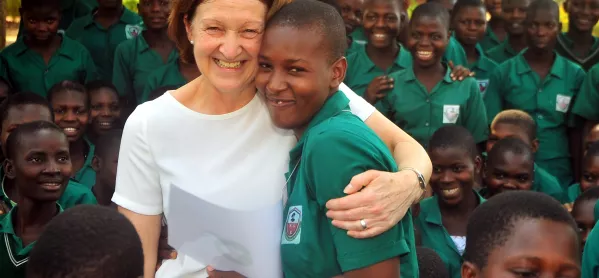Questions from Uganda stump Newcastle schoolgirls

Many of the questions read out during assembly at Newcastle High School for Girls reflected the everyday concerns of teenagers: career ambitions, family, the weather.
Others, less so: HIV infection, rape and how to avoid being forced into marriage before the end of school also came up.
When Hilary French (pictured, centre left), headteacher of the Newcastle upon Tyne independent school, was invited to accompany representatives from the girls’rights charity Plan UK on a trip to Uganda, she asked her pupils to compile a list of questions for their Ugandan counterparts.
“They wrote the kinds of questions you’d expect secondary school girls here to ask,” Mrs French said. “What do you like reading? What subjects do you like at school? What’s your favourite food? Do you go to the cinema? What do you want to be?”
She took the questions with her during her visit to a girls’ school in Kamuli, a rural area of Uganda. And, along with the answers, she returned to Newcastle with a list of reciprocal questions from the Ugandan teenagers.
Some of the questions were exactly what the Newcastle pupils might have expected: “What’s the weather like in your country?” and “Is your country as beautiful as ours?”
And then there were others. “My parents want me to get married, and I’m only 13,” one Ugandan girl wrote. “What do you think I should do?”
Some of the questions were even more disturbing. “How do I stop my father hitting me?” one Ugandan schoolgirl wrote. Another said: “How would you advise someone who has Aids?”
One pupil asked: “What should I do when the old man comes in the night?”
“The disconnect between the worlds was really highlighted by the questions they sent back,” Mrs French said. “The Kamuli headmistress says that, at the start of every term, she gives each of her pupils a medical test to check she isn’t pregnant and that she hasn’t been abused during the holidays.”
Several of the questions reflected the Ugandan teenagers’ fears about what would happen if their families refused to continue paying for their schooling. Others - many of whom walk miles to school each day through Ugandan dust, often without shoes - asked whether Britain was as dusty as Uganda.
“It really made the girls think,” Mrs French said. “I think they were quite stunned: they weren’t as talkative as they usually are.”
Year 13 student Tizzy Lawson was among those surprised by the Ugandan questions. “It was so shocking how these taboo subjects in our society were just questions in their society,” she said. “Girls of 11 talking about their uncle raping them. They shouldn’t even know about it at their age.
“Our responses would just be so feeble. I’d be embarrassed to say ‘I’ve never experienced that’ when they’ve been through so much.”
Jasmine Summers, who is also in Year 13, has considered how she would respond to a question asking what she would do if she found out that she was HIV-positive. “In a country like the UK, the obvious response would be to go to your school or youth clinic or doctors,” she said. “We have such a strong support system around us. I think it really highlighted the differences between the cultures.”
The Newcastle pupils have already organised a 10km sponsored walk - the average distance that a Ugandan schoolgirl has to walk, in order to fetch water for her family - raising more than £6,000 for Plan UK.
But the project has also had another, equally surprising outcome. When asked what careers they wanted to have when they finished school, many of the Ugandan teenagers said that they wanted to be teachers, doctors, lawyers or police officers. This has made many of the Newcastle pupils question their own assumptions.
“Although our cultures are so different, they’re actually very, very similar,” said Jasmine. “The fundamental difference is that, in the UK, we can achieve our dreams. It made a lot of girls here realise how fortunate they are.”
Keep reading for just £1 per month
You've reached your limit of free articles this month. Subscribe for £1 per month for three months and get:
- Unlimited access to all Tes magazine content
- Exclusive subscriber-only stories
- Award-winning email newsletters



